Film and Stage Adaptations of 84 Charing Cross Road
By Elodie Barnes | On April 5, 2024 | Updated March 15, 2025 | Comments (0)
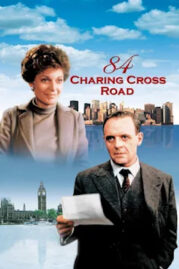
In the decades after 84, Charing Cross Road by Helene Hanff was published, it was adapted for the stage, film, and radio. The adaptations brought the book to new audiences and were incredibly popular, although they received mixed critical reviews.
Written by American author and playwright Helene Hanff, 84 Charing Cross Road is an eclectic, endearing collection of her twenty-year trans-Atlantic correspondence with London antiquarian bookshop Marks & Co. on Charing Cross Road. The book was a cult success in both America and the UK.
Today, the film is still available to watch on major streaming channels, and the play is regularly performed by theatre companies on both sides of the Atlantic.
. . . . . . . . . .
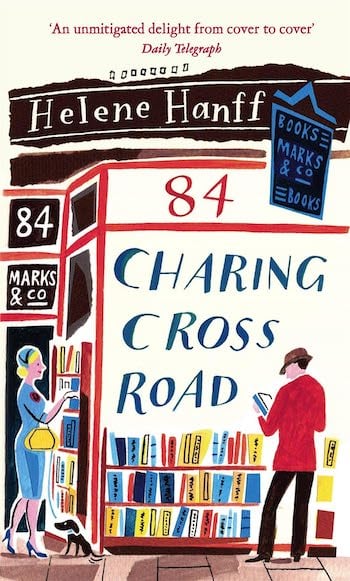
. . . . . . . . . .
The book that started it all
In 1949, struggling New York playwright Helene Hanff wrote her first letter to London bookshop Marks & Co, after seeing one of their advertisements in the New York Times Saturday Review of Literature. She enclosed a list of books that she was looking for, explaining that:
“The phrase ‘antiquarian booksellers’ scares me somewhat, as I equate ‘antique’ with expensive. I am a poor writer with an antiquarian taste in books and all the things I want are impossible to get over here except in very expensive rare editions, or in Barnes & Noble’s grimy, marked-up school-boy copies…”
This letter was the start of twenty years of correspondence between Helene and Frank Doel, the chief buyer and manager of Marks & Co. Over time the letters grew to include other members of staff at the shop, as well as Frank’s wife Nora, and a business arrangement grew into a deep friendship.
Helene sent gifts, holiday packages, and food parcels to the shop, both to thank them for their efforts in finding her books and to help alleviate the worst of British post-war rationing. The letters covered subjects as diverse as John Donne, the perfect recipe for Yorkshire puddings, baseball, and the coronation of Elizabeth II.
Although Helene wanted desperately to travel to the UK, her financial circumstances precluded it, and Frank died unexpectedly from peritonitis in 1969. It was only then that Helene thought of gathering their correspondence into a book. 84 Charing Cross Road was published in 1970, and its success finally enabled Helene to make the journey to visit London and the now-closed bookshop.
. . . . . . . . . .
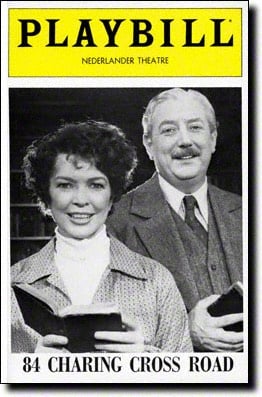
. . . . . . . . . .
84 Charing Cross Road – the play
In 1980, British theatre director James Roose-Evans adapted the book for the stage, with Helene’s help. Ironically, given that she was a playwright herself, it was the only thing of hers that was ever produced for the theatre. It premiered at the Salisbury Playhouse in 1981, before transferring to the West End and later Broadway.
It played at the Ambassadors Theatre in London from November 1981 to April 1983 and starred Rosemary Leach as Helene and David Swift as Frank. Helene was in London at the time and attended the opening night. Reviews were universally good, and Irving Wardle wrote in The Times that the poignancy of the occasion seemed like “the end of a fairytale.”
The play then toured nationally in the UK, and Rula Lenska and Bill Gaunt took over the lead roles. The tender, bittersweet comedy was a hit with audiences, and its appeal lasted long after the first run finished. It returned to the Salisbury Playhouse in February 2015, with Clive Francis and Janie Dee as Frank and Helene, and then in 2018 began another nationwide tour at the Cambridge Arts Theatre, with Clive Francis starring again alongside Hollywood actress Stefanie Powers as Helene.
The Broadway production, however, was not so successful. It opened in December 1982 at the Nederlander Theater, with Ellen Burstyn and Joseph Maher in the lead roles, but the reviews on this side of the Atlantic were mixed. Frank Rich wrote in the New York Times:
“After seeing Charing Cross Road, the tiny divertissement that opened at the Nederlander Theater last night, you don’t feel as if you’ve been to the theater, but to afternoon tea … [it] is a staged reading that’s been tricked-up into a Broadway production by the casting of a star and by the erection of an imposing Oliver Smith set … 84 Charing Cross Road is high-minded but resolutely nonintellectual — a play for those who get more pleasure out of owning handsome old books than reading them.”
It ran for 96 performances before closing.
. . . . . . . . . .
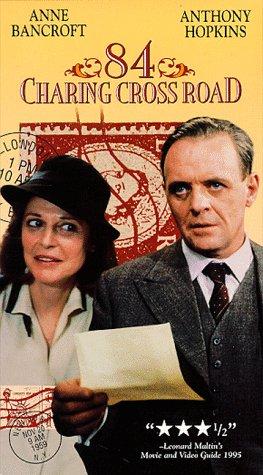
. . . . . . . . . .
84 Charing Cross Road – the film
In the mid-1980s, production began on a film adaptation of the book. The screenplay was adapted by Hugh Whitemore from the play script (not directly from the book itself), and the film was directed by David Hugh Jones.
The all-star cast included Anne Bancroft as Helene, Anthony Hopkins as Frank, and Judi Dench as Frank’s wife Nora, and Anne Bancroft’s husband Mel Brooks was also an executive producer.
It was co-produced in Britain and the US by Brooksfilms and Columbia Pictures and was shot on location in both London and New York with two entirely separate production teams. This is reflected in the closing credits, when a split screen shows Helene Hanff in New York and Frank Doel in London, and the crews for the two cities scroll side by side.
The London settings included Buckingham Palace, Trafalgar Square, St James’s, Westminster, Soho Square, White Hart Lane in Tottenham, and Richmond, while famous New York settings included Central Park, Madison Avenue, and St Thomas Church. Most of the interior sequences were filmed at Lee International Studios and Shepperton Studios in Surrey.
The film received mixed critical reviews. Variety described it as “an appealing film on several counts, one of the most notable being Anne Bancroft’s fantastic performance in the leading role. She brings Helene Hanff alive in all her dimensions, in the process creating one of her most memorable characterizations.”
Gene Siskel wrote in the Chicago Tribune , “Years ago, 84 Charing Cross Road would have been called “a woman’s picture” or a “perfect matinee.” But it’s that and more. It should be irresistible to anyone able to appreciate the goodness of its spirit and its spirited characters…”
In the New York Times, however, Vincent Canby called it “a movie guaranteed to put all teeth on edge…a movie of such unrelieved gentleness that it makes one long to head for Schrafft’s for a double-gin martini straight up and a stack of cinnamon toast from which the crusts have been removed.”
For the Chicago Sun-Times, Roger Ebert wrote: “The film is based on a hit London and New York play, which was based on a best-selling book. Given the thin and unlikely subject matter, that already is a series of miracles. And yet some people are pushovers for this material. I should know. I read the book and I saw the play and now I am reviewing the movie, and I still don’t think the basic idea is sound…”
Despite these few lukewarm reviews, the film was a success at the box office, taking over a million dollars in the US. It also appeared at the 1987 São Paulo International Film Festival, the 1988 Munich Film Festival, and the 1987 Moscow International Film Festival, where Anthony Hopkins won an award for Best Actor and David Hugh Jones was nominated for the Golden Prize for direction.
Anne Bancroft won a Best Leading Actress BAFTA award in 1988 for her portrayal of Helene, while Judi Dench was nominated for Best Supporting Actress, and Hugh Whitemore was nominated for Best Adapted Screenplay. In 1989, Helene Hanff and Hugh Whitemore shared the USC Scripter Award for the screenplay.
. . . . . . . . . .
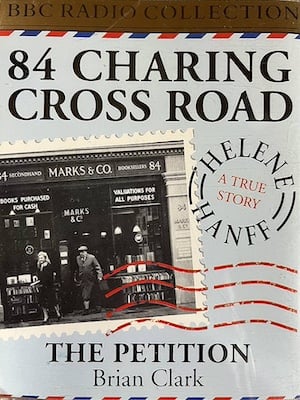
. . . . . . . . . .
84 Charing Cross Road – on the radio
The book has also been adapted for British radio several times. It was first broadcast on BBC Radio 3 in 1976, in an adaptation by Virginia Browns that starred Margaret Robertson as Helene and Lyndon Brook as Frank.
James Roose-Evans, having already written the play script, adapted it again for radio in 1992; this production starred Frank Finlay and Miriam Karlin. A further production in 2007 starred Gillian Anderson and Denis Lawson and was broadcast on Christmas Day on BBC Radio 4.
Contributed by Elodie Barnes. Elodie is a writer and editor with a serious case of wanderlust. Her short fiction has been widely published online and is included in the Best Small Fictions 2022 Anthology published by Sonder Press. She is Books & Creative Writing Editor at Lucy Writers Platform, she is also co-facilitating What the Water Gave Us, an Arts Council England-funded anthology of emerging women writers from migrant backgrounds. She is currently working on a collection of short stories, and when not writing can usually be found planning the next trip abroad, or daydreaming her way back to 1920s Paris. Find her online at Elodie Rose Barnes.
Leave a Reply